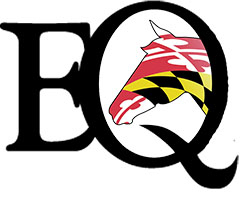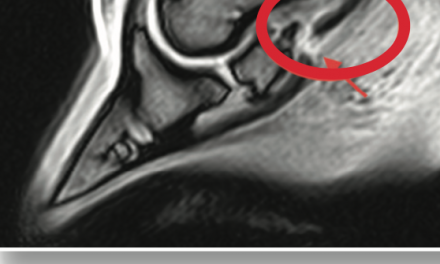
photos taken by Equiery staff on April 29 as horses arrived at Paradise Stables
On April 29, 2011, what is currently the undisputed largest seizure of horses in the Maryland occurred in Queen Anne’s County when Days End Farm Horse Rescue, at the behest of the county’s State’s Attorney, spearheaded the impoundment of a herd of over 140 Polish Arabians from Canterbury Farms in Centreville.
This is a complicated case of animal neglect, possibly criminal (felony) neglect. The Equiery will follow the story from all angles. For this first installment, The Equiery is providing an update on the location of the horses and their current health status, as well as some basic background information. Future installments will explore the legal aspects of the situation in Queen Anne’s county, the perspective of the situation from other points of view, and follow-up interviews with other humane agencies, rescues, sanctuaries and individuals involved with this process. We will also look at the Arab breeding market, how it has changed over the years. If you have thoughts, comments, leads or questions, please e-mail them to editor@equiery.com.
UPDATE: May 12, 2011
Since collecting 140 feral and semiferal malnourished and neglected horses on the Eastern Shore of Maryland, loading them onto trailers and relocating them to a network of hastily assembled satellite facilities in Central Maryland on April 29, organizers and volunteers spent the next 10 days vetting and sorting the horses and seeing what they had on their hands.
Finally, Days End Farm assistant director Brooke Vrany was able to take a breath and provide more background information for The Equiery community.
When and how did Days End become involved?
On April 15, according to Brooke Vrany, Queen Anne’s County Animal Services (a division of the Queen Anne’s County government) and the Humane Society of the United States requested the services of Days End Farm Horse Rescue. Acting under the authority of the Queen Anne’s County State’s Attorney’s office, seven malnourished horses in need of critical care were removed and relocated to Days End’s satellite facility in Hagerstown. The owner of the horses and of the property, Marsha Parkinson, voluntarily allowed six malnourished horses to be euthanized.
Between April 15 and April 28, arrangements were made to move more horses on April 29. Private facilities were recruited, including Paradise Stables in Mount Airy, which agreed to take up to 70 horses at their satellite location, Paradise 2 on Lime Plant Road.
How many horses are there and where are they now?
According to various sources, due to the secluded nature of the farm and the large pasture herds, the authorities did not have a clear knowledge of the exact number of horses on the farm or the exact number of horses in precarious health, and thus they were not able to ascertain exactly how many horses would be removed on April 29.
Ultimately, organizers believe that they were able to locate and remove all horses from Canterbury Farm. Including the six that were euthanized on April 15, a total of 146 horses were removed.
The largest number of horses (70) went to Paradise Stables, but several other rescues have accepted horses as well. As of May 12, there are 52 horses at Day’s End various satellite facilities, 56 at Paradise, 10 at Gentle Giants, 11 at Summerwinds and 9 at Lost & Found Horse Rescue (Germantown). Two horses are at a foster home.

An example of the hoof condition of many of the horses seized.
What is the current status of their health? Have any more been euthanized?
No more horses have been euthanized.
Currently, 15 are in intensive care, and all the rest, until given a clean bill of health, are considered in critical care. As of this report, organizers are still vetting and awaiting pregnancy results on several mares. So far, there is one confirmed pregnancy. At least 40 are considered emaciated. Most of the others are infected with parasites and lice. Lack of hoof care has critically compromised the joint and conformation of the developing horses. Several never had their weanling halters removed, and the faces grew around the halters. Overall, Brooke says that the horses are stable.
Rare Bloodlines? Valuable Breeding Stock?
Canterbury advertises itself as the largest breeder of Polish Arabians in America, with some of the most exclusive bloodlines. The owner of Canterbury, Marsha Parkinson, is listed as the current vice president of Korona, the Polish Arabian Breeders Society. Marsha Parkinson has not yet provided her perspective for The Equiery.
The Equiery has been receiving emails and phones calls regarding rumors that Days End was planning mass geldings; the rumors were sending fans of the bloodlines into apoplexy and social media sites have became engulfed in flames of righteous indignation.
Brooke Vrany has denied that Days End is planning to geld any breeding stock, and has expressed an interest in insuring help to the Polish Arabian community to preserve some of the bloodlines. According to Brooke, “I’ve reached out to the Arabian Horse Association and Korona [the Polish Arabian Breeders Society]. We would like to keep these horses registered and [once legally allowed to do so] place them in homes that will highlight their skills, if that opportunity arises. We’d like for the AHA [Arabian Horse Association] to own responsibility and better safeguard their stock.”

Horses being unloaded at Paradise Stables on April 29
Follow the Money
On April 29, 2011, Days End issued a press release for which it has received a great deal of criticism in the equestrian community. The purpose of the press release seemed to be to solicit up to $1 million dollars in donations. The press release stated: “An individual horse in this condition will cost close to $5,000 for the initial six months…[w]ith 150 animals and unknown health and care issues that add to the cost, Days End Farm Horse Rescue is looking at bills easily surpassing $1 million over the next six (6) months just for these animals. These monies are in addition to the operational costs already attached to our main facility where we currently have over 70 horses being treated and watched for not only their original ailments, but for also a mild strain of equine strep throat…Anyone wishing to help financially to the care of these animals can do so by sending their tax deductible contribution to …”
Knowledgeable professionals in the field of equine veterinary medicine scoffed at these figures. Lifelong horsemen questioned how humane it is to keep alive certain critical care horses, particularly when there are so many for which to care. Equestrians across the spectrum were offended by what they believed was a press release that was crass and opportunistic.
The Equiery pressed Brooke for a clarification, noting that the estimate in the press release of $1 million dollars was based on an average of $5,000 for a horse “in this condition.” The Equiery asked for a definition of “in this condition” and Brooke replied that the $5,000 cost over six months was based on the average cost of a wide variety of “worst case” scenarios, and that this figure includes all overhead, including (but not limited to) rent/mortgage, staffing, hay, gas, transportation and tolls, utilities, worming, bedding, equine supplies, farrier care, fecal tests, vetting, blood work, training, volunteer time (which is assigned a monetary value), feed, wormers, national rehoming, therapeutic care, training, prescription medicine” and more. According to Brooke, Days End bases its estimates on the “full retail” value of goods and services, before services are donated or discounted.
Obviously, with donated time and goods and the costs of other goods and services steeply discounted, Days End’s actual cash outlay does not necessarily, on average, equal $5,000 over six months for each “worst case” scenario. However, by keeping strict accounting of the full costs of goods and services, Days End believes that they are able to maintain more accurate sense of the true costs of care, but every donation of goods, services or even pasture reduces the actual cash outlay needed.
Day’s End Farm has always made their books available to the public, as is required of a charity. The independent charity evaluator, Charity Navigator (which evaluates the financial health of over 5,500 of America’s largest charities for the purpose of helping potential donors determine which charities are not only legitimate but also financially responsible) has awarded Days End its highest rating of four stars. According to Brooke, 80 cents of every dollar raised is spent on the horse, 20 cents is for staff and facility.
Brooke reports that the average rescue case (as opposed to intensive care case) costs $2,500 over six months (or $416 per month). As of this report, only 15 horses are considered intensive.
According to Brooke, Days End has a signed memorandum of understanding committing Days End to fundraising on behalf of all the impounded Canterbury Arabians, and she says, “We have partnered with HSUS to cover cost[s].” Brooke indicated that Days End is hoping that their partner rescues (Gentle Giants, Lost & Found, and Summerwinds) will do some of their own fundraising to “cover their costs for [their] 10, if not, we will cover.”

Two of the 70 seized horses currently being treated at Paradise Stables
And what is going to happen to the horses?
This and more in future editions.
Questions, comments, thoughts and concerns may be sent to editor@equiery.com.
If you are looking to sell locally, put your ad in the one publication that all Maryland horse people read: The Equiery!It is not too late to get your classified in the June issue of The Equiery – or online now! Visit https://equiery.horsetrader.com/beginorder.asp?pid=10 or call 1-800-244-9580 (or e-mail us at classifieds@equiery.com).
Visit The Equiery for a complete least of equine rescues and sanctuaries in Maryland.











